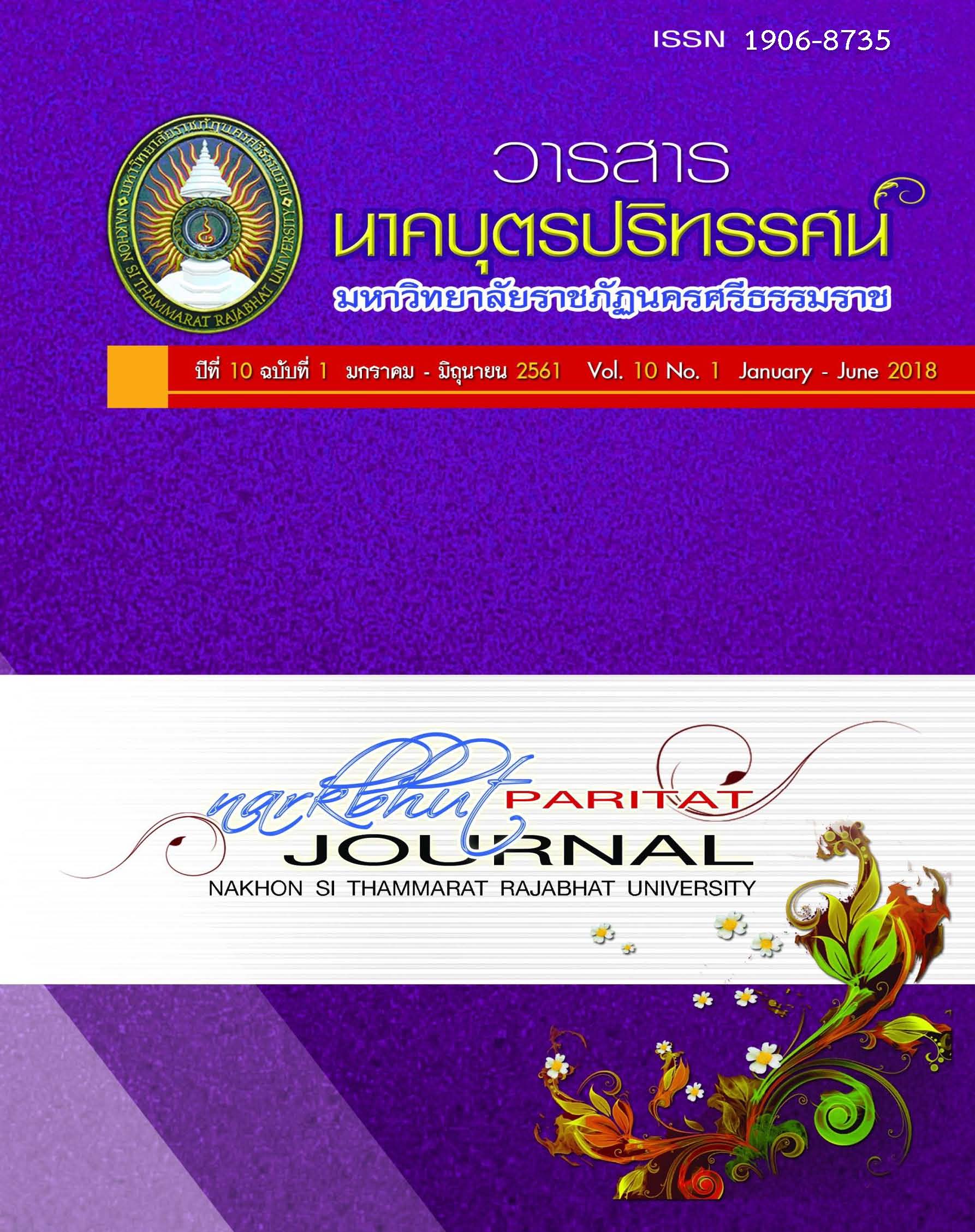กลยุทธ์การจัดการศักยภาพการแข่งขันของโรงเรียนเอกชนนอกระบบในประชาคมเศรษฐกิจอาเซียน The Competitiveness Potential Management Strategy of Non – Formal Education Schools in ASEAN Economic Community
Main Article Content
บทคัดย่อ
บทคัดย่อ
การวิจัยมีวัตถุประสงค์ 1) เพื่อศึกษากลยุทธ์การจัดการศักยภาพการแข่งขันของโรงเรียนเอกชนนอกระบบในประชาคมเศรษฐกิจอาเซียน 2) เพื่อพัฒนากลยุทธ์การจัดการศักยภาพการแข่งขันของโรงเรียนเอกชนนอกระบบในประชาคมเศรษฐกิจอาเซียน 3) เพื่อประเมินประสิทธิผลการใช้กลยุทธ์การจัดการศักยภาพการแข่งขันของโรงเรียนเอกชนนอกระบบในประชาคมเศรษฐกิจอาเซียน ใช้ระเบียบวิธีวิจัยแบบผสมผสานวิธีคือการวิจัยและพัฒนากับการวิจัยเชิงปฏิบัติการ การมีส่วนร่วม กลุ่มเป้าหมาย นักเรียนโรงเรียนรัตนวดีการช่างได้มาโดยวิธีการเลือกแบบเจาะจง เครื่องมือที่ใช้ ได้แก่ แบบวิเคราะห์เอกสาร แบบสัมภาษณ์เชิงลึก แบบสังเกต แบบบันทึกการประชุมเชิงปฏิบัติการ แบบสัมภาษณ์ผู้เชี่ยวชาญ แบบตรวจสอบกลยุทธ์ แบบสนทนากลุ่ม แบบประเมินประสิทธิผลกลยุทธ์ การวิเคราะห์ข้อมูล ได้แก่ การวิเคราะห์เนื้อหา ค่าความถี่ ค่าร้อยละ ค่าเฉลี่ย ส่วนเบี่ยงเบนมาตรฐาน การสรุปข้อมูลแบบอุปมัยและตีความข้อมูล ผลการวิจัย พบว่า
- กลยุทธ์การจัดการศักยภาพการแข่งขันของโรงเรียนเอกชนนอกระบบในประชาคมเศรษฐกิจอาเซียนได้แก่
หลักสูตรที่แตกต่างและโดดเด่น สื่อและอุปกรณ์ในการจัดการเรียนการสอน การสร้างความสัมพันธ์กับหน่วยงานภายนอกและการบริการช่วยเหลือสังคม การส่งเสริมทักษะภาษาต่างประเทศในการสื่อสารสู่สากล การประชาสัมพันธ์องค์กร การจัดการเรียนการสอน
- การพัฒนากลยุทธ์การจัดการศักยภาพการแข่งขันของโรงเรียนเอกชนนอกระบบในประชาคมอาเซียน ประกอบด้วย วิสัยทัศน์ เป็นผู้นำในการจัดการศึกษาวิชาชีพในระดับภูมิภาคให้ผู้เรียนมีทักษะความสามารถในระดับสากล พันธกิจ 1) ผลิตนักเรียนในหลักสูตรสาขาวิชาชีพให้สามารถประกอบอาชีพตามความต้องการของตลาดแรงงานในระดับสากล 2) พัฒนาทักษะวิชาชีพร่วมมือกับเครือข่ายเพื่อให้ผู้เรียนมีความสามารถแข่งขันในระดับสากล 3) ให้บริการทักษะวิชาชีพด้านวิชาการและบริการชุมชนการพัฒนาแผน กลยุทธ์ ประกอบด้วย 4 กลยุทธ์ (NICE) 1) สร้างเครือข่ายพันธมิตร (Network) 2) ยกระดับมาตรฐานสู่สากล (International-standard) 3) สื่อสารแบบบูรณาการ (Integrated Communication) 4) การสร้างหลักสูตรที่มีประสิทธิภาพ (Efficient- Course)
- ประสิทธิผลการใช้กลยุทธ์การจัดการศักยภาพการแข่งขันของโรงเรียนเอกชนนอกระบบในประชาคมเศรษฐกิจอาเซียน พบว่า ผลสำเร็จของการดำเนินงานตามแผนบรรลุเป้าหมายตัวชี้วัด คิดเป็นร้อยละ 82.61 ความพึงพอใจของผู้เรียนต่อการดำเนินงานตามแผนอยู่ในระดับมาก
Article Details
เอกสารอ้างอิง
Bunyatisthan, A. (2010). Professional SWOT Analysis Guide. Bangkok: Panyachon Publishing
House.
Chalachol, S. (2010). The Development of Professional Standard for Thai Hairdressers.
(Doctoral of Philosophy’thesis). Ramkhamhaeng University.
Chatreewisit, R. (2010). Strategic management. 2nd Edition. Bangkok: In house knowledge
Publishing House.
Duangwiset, P. (2000). A Development of Strategic Plan for Instructional Quality
Dvelopment ineducation in Rahabhat Institues. Doctoral of Education’thesis (Higher
Education). Chulalongkorn University.
Ferrell, O. C. & Hartline, M. D. (2008). Marketing Strategy. South-Western College.
Guskey, T. R., (2000). Evaluation professional development. California: A Sage Publication
Company.
Jantawanich, A. (2004). Development of Education Quality. Bangkok: Prik wan graphic
Publishing House.
Kotler, Phillip and Lee, Nancy. (2005). Corporte Social Responsibility: Dong the most good for
your company and your cause. United States of America: John Wiley & Sons Inc.
Ministry of Industry, (2014). Project Implementation Guide for Small and Medium Enterprises.
Bangkok: Office of Project Coordination and Management.
Office of the Private Education Commission. (2009). Guide for Operation Internal Quality
Assurance of the Private Education Commission. Retrieved May 26, 2012 from http://www.nfe-opec.com.
Pasakhornjaral, S. (2014). ASEAN Business. Bangkok : McGraw-Hill Thailand.
Puangnil, P. (2010). Strategies of Educational Resources Mobilization for Improving Public Basic
Education School in Maha Sarakham Province. (Doctor of Education’thesis). Khon Kaen University.
The National Education Act and amendments, (1999). (2nd Edition). BE, 2545. Development of
quality education for the Thai people. Bangkok.
The Non-formal Education Promotion Unit. (2009). Educational Management of Non-Formal
Private Schools. Bangkok: Office of the Private Education Commission
U-on,V. (2008). Strategic management. 4 th edition. Bangkok: Print at Me Publishing House.
Witoonchat, M. (2008 ). Development of Administrative Strategies for Promoting Child-
Centered Learning in Private Basic Education Schools levels 1-2 in Bangkok. (Doctor
of Philosophy’thesis). Saint John’s University.


